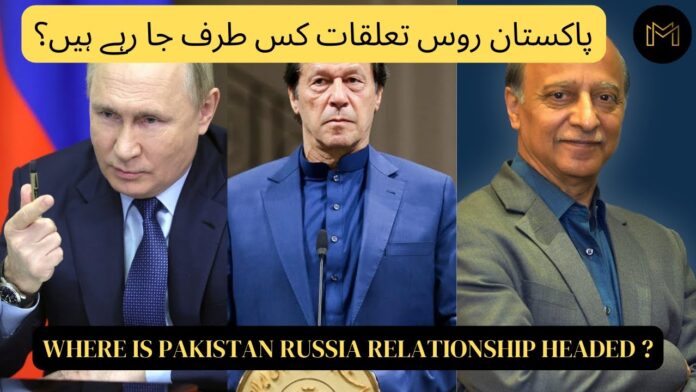In this article, Imtiaz Gul says until Russia looks at the relationship independent of Afghanistan, drugs and its political/commercial relations with India, its ties with Islamabad will not not transcend into a solid relationship
In the new geopolitical order, Pakistan and Russia have been warming up to each other. Russia supports China Pakistan Economic Corridor (CPEC). Sub-ministerial level engagements in trade, education, and energy have picked up like never before. The Russian leadership wants to intensify cooperation in security and counter-narcotics under the banner of the Shanghai Cooperation Organization (SCO).
Moscow views Pakistan’s current foreign policy as more independent, assertive, and grounded in the region. It also highly appreciates Islamabad’s role in regional peace and stabilization efforts i.e. intensive engagement and facilitation on Afghanistan, starting with the Doha Process.
The element of suspicion – because of the long years of Pakistan’s engagement with the United States – has made way to an unusual bilateral trust because of the latter’s “ open and straight talk” on regional issues. The Sino-Pak relations, particularly after PM Khan’s early February visit, provide another indication for Islamabad’s look-East policy.
One common denominator – as far as Russian and Chinese understanding goes – is the perceived realization that Pakistan doesn’t want to be used by others again.
Russia on its part is keen to expand relations, particularly in the energy sector. It supports the energy corridor projects– CASA1000 and TAPI – from Central Asia through Afghanistan to Pakistan.
On the face of it, this augurs well for both countries and promises big prospects.
But there are basic roadblocks to it;
Several Russian companies are under US sanctions and hence unable to directly invest in Pakistan.
Secondly, the Russians are one of the largest military hardware suppliers to India. And this is billions of dollars. And the decision-makers in Moscow would therefore not like to annoy India by reaching out to Pakistan in a big economic way. They are hamstrung by their geo-commercial interests.
This is what limits the Russian geopolitical engagement with countries like China and Pakistan.
Thirdly, Moscow still looks at Pakistan through the security prism. It believes the terrorist havens in that country represent a big threat to all neighbors. The Afghan Taliban regime, according to Russian officials, remains neutral, if not aligned with most of the groups such as TTP, ETIM, IMU, and ISIK.
They recall that following its defeat in Syria, ISIS now openly declares Russia as its enemy and keeps calling on cadres to go after the Russian interests. These anti-Russia “jihad” calls are omnipresent in the ISIS literature, and hence a constant source of concern for Moscow.
So, the Russian focus remains counter-terrorism – without looking at the proxy nature of this menace. They are reluctant in drawing in Iran and India in the counter-terror debate because of their unusually and commercially-driven linkages.
Russia considers Pakistan as the key of influence – at least over the Haqqani Network – and expects it to exercise that leverage for preventing the Afghanistan-based Islamic Movement of Uzbekistan as well as the ISIK from hitting at the Central-Asian as well as Russian interests.
Fourth, Moscow is also worried about the continued flow of narcotics from Afghanistan via Central Asia and wants to stem the supply chain with Pakistan’s support.
By implication, terrorism and narcotics rooted in Afghanistan constitute the core of Pakistan-Russia relations – as much as the US used the same issues for its two decades of presence in Afghanistan.
What does this all mean? Pakistan-Russia relations will remain hamstrung, primarily by the Russian concerns on terrorism and narcotics on the one hand, and its commercial interests tied to India on the hand. And if this consideration weighs heavier than the desire for boosting relations with Pakistan, the bilateral relations will likely remain hostage to tactical, geopolitical considerations and not necessarily evolve into a win-win long-term engagement. Unless Moscow embraces the BRI concept for reaching out to critical neighbors, the bilateral engagement will largely remain security-centric.
Going by the current indicators, the fear of annoying Tehran and New Delhi will probably keep Moscow from substantial economic or military engagement with Pakistan.




